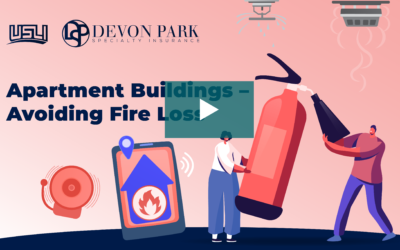Electrical fires involving some type of electrical failure or malfunction account for roughly 51,000 fires in the United States each year, amounting to $1.3 billion in property damage. Follow our tips to decrease the likelihood and severity of an electrical fire loss at your premises.
Potential Problem Areas |
Why? |
Tips |
Faulty Outlets and Appliances |
Most electrical fires are caused by faulty outlets and outdated appliances. | Monitor your appliances for worn or frayed cords as they can send heat onto combustible surfaces (e.g., floors, curtains, rugs) that can start a fire. Additionally, never run electrical cords under carpets or other materials. |
Wiring |
Outdated or faulty wiring can also lead to an electrical fire, and it can often be tied back to the age of the building. Older buildings may not have the wiring capacity to handle the increased amperage of today’s electrical appliances and electronics. | If your building is more than 20 years old, it is recommended that you have electrical inspections done every few years to ensure your system is working correctly. If your building is less than 20 years old, inspections are recommended after purchase of the building, before any renovations and after any storm damage. |
Light Fixtures |
Installing a lightbulb with a wattage that is too high for a light fixture (such as a lamp) is a leading cause of electrical fi res. A standard light bulb and a light fixture will list wattage amounts that should be adhered to. | Always check the maximum recommended bulb wattage on any light fixture or lamp, and never go above the recommended amount. |
Extension Cords |
The most common misuses of extension cords are overloading them and plugging multiple extension cords into one another. | Only use extension cords as a temporary measure. Appliances should be plugged directly into an outlet; they should not be plugged into an extension cord for any length of time. Hire an electrician to install the appropriate outlets for your appliances, if necessary. Never plug multiple extension cords together, even temporarily. |
Space Heaters |
Space heaters work well as a temporary heat source, but they pose a threat if they are operating near combustible items or running for an extended period of time. Common combustible items that should be kept at a distance from space heaters include curtains, beds, clothing, chairs, couches and rugs. | If you use space heaters, opt for the radiator type that diffuse heat over the entire surface of the appliance rather than coil-type space heaters. These are less likely to ignite flammable items, but they should still be kept away from these items. |
General Electrical and Fire Safety Tips
- Install smoke detectors on every level of the home, inside each bedroom and outside each sleeping area
- Test the smoke detectors monthly to ensure they work properly
- Always use a licensed and insured electrician for any electrical work
- In homes with young children, install tamper-resistant receptacles to prevent electrical shocks and burns
- Conduct a basic assessment of your electrical system, electrical cords, extension cords, power plugs and outlets on a regular basis
- Look for telltale signs of electrical problems, such as those listed below, and contact a licensed and insured electrician immediately (if necessary):
- Dim and flickering lights
- Unusual sizzling and buzzing sounds from your electrical system
- Circuit breakers that trip repeatedly







